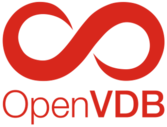| OpenVDB | AX | Nano | Houdini |
|---|---|---|---|
Website | Discussion Forum | Documentation
OpenVDB is an open source C++ library comprising a novel hierarchical data structure and a large suite of tools for the efficient storage and manipulation of sparse volumetric data discretized on three-dimensional grids. It was developed by DreamWorks Animation for use in volumetric applications typically encountered in feature film production.
This GitHub repository hosts the trunk of the OpenVDB development. This implies that it is the newest public version with the latest features and bug fixes. However, it also means that it has not undergone a lot of testing and is generally less stable than the production releases.
OpenVDB is released under the Mozilla Public License Version 2.0, which is a free, open source software license developed and maintained by the Mozilla Foundation.
The trademarks of any contributor to this project may not be used in association with the project without the contributor's express permission.
OpenVDB welcomes contributions to the OpenVDB project. Please refer to the contribution guidelines for details on how to make a contribution.
The following provides basic installation examples for the core OpenVDB library. Other components, such as the python module, OpenVDB AX and various executables, may require additional dependencies. See the build documentation for help with installations.
apt-get install -y libboost-iostreams-dev
apt-get install -y libboost-system-dev
apt-get install -y libtbb-dev
apt-get install -y libblosc-dev
git clone git@github.com:AcademySoftwareFoundation/openvdb.git
cd openvdb
mkdir build
cd build
cmake ..
make -j4
make install
brew install boost
brew install tbb
brew install c-blosc
git clone git@github.com:AcademySoftwareFoundation/openvdb.git
cd openvdb
mkdir build
cd build
cmake ..
make -j4
make install
Note that the following commands have only been tested for 64bit systems/libraries.
It is recommended to set the VCPKG_DEFAULT_TRIPLET environment variable to
x64-windows to use 64-bit libraries by default. You will also require
Git, vcpkg
and CMake to be installed.
vcpkg install zlib:x64-windows
vcpkg install blosc:x64-windows
vcpkg install tbb:x64-windows
vcpkg install boost-iostreams:x64-windows
vcpkg install boost-system:x64-windows
vcpkg install boost-any:x64-windows
vcpkg install boost-algorithm:x64-windows
vcpkg install boost-uuid:x64-windows
vcpkg install boost-interprocess:x64-windows
git clone git@github.com:AcademySoftwareFoundation/openvdb.git
cd openvdb
mkdir build
cd build
cmake -DCMAKE_TOOLCHAIN_FILE=<PATH_TO_VCPKG>\scripts\buildsystems\vcpkg.cmake -DVCPKG_TARGET_TRIPLET=x64-windows -A x64 ..
cmake --build . --parallel 4 --config Release --target install
First example: building NanoVDB and OpenVDB core
NanoVDB is now a module of the larger OpenVDB project. A user can build both libraries together. This will build the OpenVDB core library, install the NanoVDB header files, and build the NanoVDB command-line tools in the build/nanovdb/cmd directory. From the 'root' OpenVDB project directory (change the dependency paths to match your environment):
foo@bar:~$ mkdir build
foo@bar:~$ cd build
foo@bar:~$ cmake .. -DUSE_NANOVDB=ON -DTBB_ROOT=/path/to/tbb -DBOOST_ROOT=/path/to/boost -DBLOSC_ROOT=/path/to/blosc -DCMAKE_INSTALL_PREFIX=/install/path
foo@bar:~$ make -j 4 && make installNote that the default value of NANOVDB_USE_OPENVDB is linked to OPENVDB_BUILD_CORE option and can be overriden by passing on -DNANOVDB_USE_OPENVDB=OFF. The Boost library is included because it is a requirement for building OpenVDB.
In general, CMake will try to find every optional dependency when a user opts to add an additional dependency. Be sure to check the CMake log to see what dependencies were not found.
Second example: NanoVDB with no dependencies
From the 'root' OpenVDB project directory:
foo@bar:~$ mkdir build
foo@bar:~$ cd build
foo@bar:~$ cmake .. -DUSE_NANOVDB=ON -DOPENVDB_BUILD_CORE=OFF -DOPENVDB_BUILD_BINARIES=OFF -DNANOVDB_USE_TBB=OFF -DNANOVDB_USE_BLOSC=OFF -DNANOVDB_USE_ZLIB=OFF -DCMAKE_INSTALL_PREFIX=/install/path
foo@bar:~$ make -j 4 && make installAnother option is to build it from the NanoVDB directory itself, which is much simpler:
foo@bar:~$ cd nanovdb/nanovdb
foo@bar:~$ mkdir build
foo@bar:~$ cd build
foo@bar:~$ cmake .. -DCMAKE_INSTALL_PREFIX=/install/path
foo@bar:~$ make -j 4 && make installBoth options will install the NanoVDB header files to the /install/path as well as building nanovdb_print and nanovdb_validate executable. The path where these executables are installed will be different: in the first option they will be under build/nanovdb/cmd directory; whilst in the second option they will be under the build/cmd/ directory.
Third example: build 'everything' in NanoVDB along with OpenVDB core
From the root OpenVDB directory:
foo@bar:~$ mkdir build
foo@bar:~$ cd build
foo@bar:~$ cmake .. -DUSE_NANOVDB=ON -DNANOVDB_BUILD_UNITTESTS=ON -DNANOVDB_BUILD_EXAMPLES=ON -DNANOVDB_BUILD_BENCHMARK=ON -DNANOVDB_USE_INTRINSICS=ON -DNANOVDB_USE_CUDA=ON -DNANOVDB_CUDA_KEEP_PTX=ON -DTBB_ROOT=/path/to/tbb -DBOOST_ROOT=/path/to/boost -DBLOSC_ROOT=/path/to/blosc -DGTEST_ROOT=/path/to/gtest -DCMAKE_INSTALL_PREFIX=/install/path
foo@bar:~$ make -j 4 && make installNote that if you already have the correct version of OpenVDB pre-installed, you can configure CMake to link against that library by passing the arguments -DOPENVDB_BUILD_CORE=OFF -DOPENVDB_BUILD_BINARIES=OFF -DOPENVDB_ROOT=/path/to/openvdb when invoking cmake.

